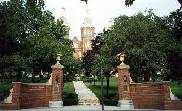
Founders Gate in 1996

Plaque on gateway |
Founders' Gate
At the front entrance to the campus, visitors will find a brick gateway, and a path leading to the main academic building. This gateway was donated by Phi Gamma Delta in honor of its six Founders. Ground was broken at the 100th Anniversary Ekklesia on June 28, 1948. It was dedicated October 29, 1949 after the homecoming convocation. At that time, five brothers served on the College Board of Trustees.
The plaques bear the Fraternity coat-of-arms and an inscription reading:
The Fraternity / of / Phi Gamma Delta /
Founded May 1, 1848 /
at Jefferson College /
by / Daniel Webster Crofts / James Elliott /
Naaman Fletcher / Ellis Bailey Gregg /
John Templeton McCarty / Samuel Beatty Wilson /
Fortiter / Fideliter / Feliciter
The Fraternity refurbished the gate in time for the 150th Anniversary Ekklesia in 1998. The plaques were stolen some years later and replaced by Alpha Chapter in 2012.
|
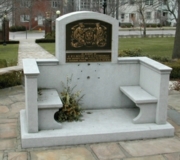
Phi Kappa Psi monument, with Founders Gate in background
|
Phi Kappa Psi Founders' Memorial
Phi Kappa Psi began at Jefferson College on February 19, 1852. It was the second of three fraternities founded there. (The third was the now-defunct Kappa Phi Lambda.)
This monument was erected in 1909 to the memory of founders C. P. T. Moore and W. H. Letherman.
Located halfway up the path between the Founders' Gate and Old Main.
|
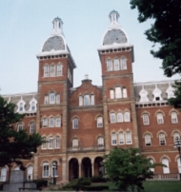
Old Main
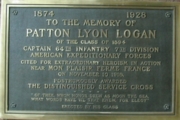
Patton Lyon Logan (WJ 1894) Plaque
|
Old Main and Logan Plaque
Old Main contains classrooms, offices, and the College chapel. A large plaque on the left of the portico memorializes Brother Patton Lyon Logan (Washington and Jefferson 1894), a decorated veteran of World War One.
"The twin towers of Old Main symbolize the union of Washington (1787) and Jefferson (1794) College as granted by the state legislature (1865). The floor emblem found in the front foyer of the building is an additional symbol of this event." 2
The second floor holds a curiosity: the plaster cast used for the head of the Jefferson Monument statue in Washington, DC. Due to the shortage of metal during World War Two, the plaster cast was painted bronze and erected inside the completed monument! It stood for several years until replaced after the war. Washington and Jefferson has displayed it since 1960.
|
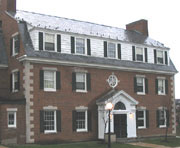
Alpha Chapter house 1950-2006
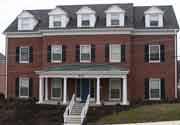
Current Chapter House |
Former and Current Alpha Chapter Houses
Located at the front of campus, the North Hall Dormitory was our chapter house from 1950 until 2006. It was the first house at W&J built for Phi Gamma Delta; for the previous sixty-odd years the chapter had resided in various residential homes adjacent to campus. (None are still extant.) The total cost was $164,000.
The first-floor room closest to Old Main was the Founders' Memorial Library. Funds from the Phi Gamma Delta Educational Foundation, the Fraternity, and graduates of other chapters provided for this room.
Facing Old Main, turn left. Walk past the Old Gym, across the street, and up the stairs. The chapter house is on the right, at 145 Beau Street.
In January, 2006 the brothers relocated to the new Greek row; that house is at the corner of East Chestnut Street and Forrest Avenue. The Founders' Library was rebuilt in the new house, and the duplicate Founders' Gate plaques relocated there from the old library.
|
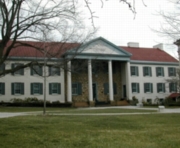
McMillan Hall
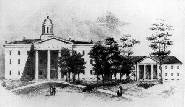
Washington College, 1850. McMillan Hall is to the right.
|
John McMillan Hall
John McMillan Hall commemorates the Presbyterian minister who founded the "log college" which grew into Jefferson College. [See Canonsburg.]
The central portion dates to 1793 and Washington Academy. The wings were added in the 1830s. It is the only original building remaining on campus.
The Hall originally stood about forty feet in front of Old Main.
Facing Old Main, turn right toward Thompson Memorial Library (now offices). Turn left to face John McMillan Hall.
|
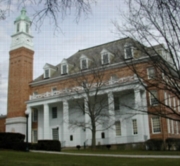
McIlvaine Hall
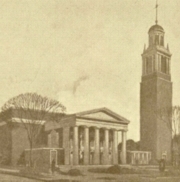
Proposed Moffat Memorial Auditorium, c.1928
|
McIlvaine Memorial Hall (site only)
In the late 1920s Washington and Jefferson proposed to build an auditorium and tower named after Dr. James D. Moffat (Washington and Jefferson 1869), college president from 1882 to 1914. The Great Depression and then World War Two interrupted fundraising. Moffat Memorial Auditorium was never built. Instead, the College approximated the result by acquiring the 1897 Washington Female Seminary building and adding the Stewart Clock Tower. McIlvaine was demolished in 2008 for the Swanson Science Center.
To see Brother Moffat's monument, look around the college grounds; he did much to bring Washington and Jefferson to the state of prominence it enjoys today. There is also a plaque to his memory in the U. Grant Miller Library (see below).
The flagpole in front of McIlvaine Hall is dedicated to Frederic H. Hill (Washington and Jefferson 1900). A plaque on the Hall memorializes gifts that made the "South Campus" possible, including Albert C. Troutman (Washington and Jefferson 1898) for landscaping.
Facing McMillan Hall, walk right, cross the street into the "South Campus". Swanson is the second building to your left.
|
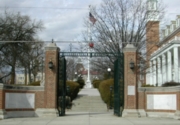
College Founders Gate
|
College Founders Gate
Need a quick history lesson on the roots of Washington and Jefferson? Look no further. One side of the gate explains the origins of Jefferson College in John McMillan's Log College (see Canonsburg). The other side describes Thaddeus Dodd's Washington Academy and the subsequent Washington College.
Facing Swanson, turn right and proceed to the street, passing through the gate.
|
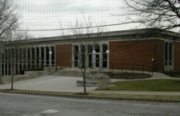
U. Grant Miller Library
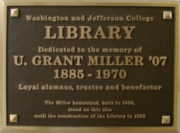
Miller memorial plaque
|
U. Grant Miller Library
U. Grant Miller (Washington and Jefferson 1907), a trustee of the college for over thirty years and a Purple Legionnaire of Alpha Chapter, provided leadership for building the current Alpha Chapter House (see above). Prior to the library's construction in 1965, his family homestead stood at this site.
Inside the library, a small plaque commemorates the book fund named after Dr. James D. Moffat (Washington and Jefferson 1869), college president from 1882 to 1914. He served as Grand Chapter secretary (1866) and president (1868).
Located on the opposite corner from the back of John McMillan Hall. Facing the Founders Gate, walk right. Cross the street and turn left. Go one block; the library is to your right at the end of the block.
|